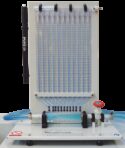Experiment
H400
CAVITATION IN A VENTURI
A floor-standing, self-contained apparatus to demonstrate and observe the basic principles of cavitation and its implications on the performance of hydraulic machines and systems.
If you have any questions or you'd like to discuss a product, please call us.
+44 1159 722 611CAVITATION IN A VENTURI
The causes and effects of cavitation are one of the most important subjects in any course on fluid mechanics. In severe cases, cavitation will damage machines and hydraulic systems. Designers and engineers must be aware of cavitation when they create a new design or installation.
TecQuipment’s Cavitation in a Venturi Unit is a purpose-designed teaching unit which enables efficient and effective investigations into the causes and effects of cavitation. It also allows students to understand the Venturi by studying upstream and throat pressures.
The Cavitation in a Venturi Unit offers a clear and easy-to-understand display of cavitation. Students create clearly visible cavitation in a Venturi (which has a transparent window) and take measurements of flow and pressure. Students use theory and practical experiments to learn how to predict the onset of cavitation. They gain practical experience of using the continuity equation and Bernoulli’s equation. They use these to calculate flow and pressure, different methods of creating cavitation and causes of error.
The apparatus is a self-contained, mobile unit. It consists of a robust frame which holds a water tank (or reservoir), an electric pump, a flow-control valve, a flow meter and a Venturi. The frame includes a handy worktop for student paperwork.
Pressure gauges show the pressure upstream of the Venturi and the pressure at the Venturi throat. A thermometer shows the temperature of the water in the tank.
The pump includes electrical protection and the water tank includes a splash cover to prevent water spillage. TecQuipment offers an optional stroboscope. This can improve the image of the cavitation.
Learning outcomes
- Flow and pressure in the Venturi
- Demonstrations of cavitation
- How to predict the onset of cavitation




